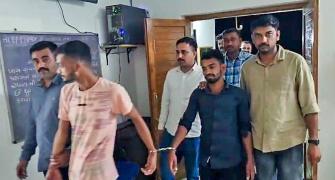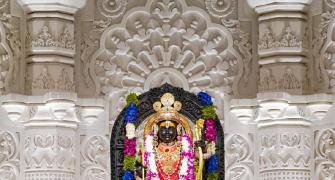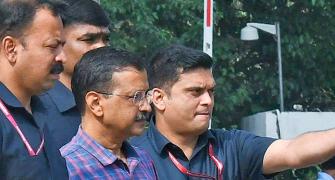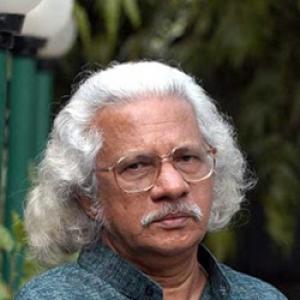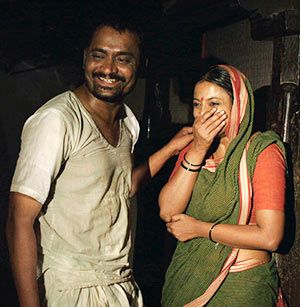 'Just like Smita Patil was unsuitable for glamour roles, I believe Nivedita is a lot in the Smita Patil mould,' P Sheshadri tells Srikanth Srinivasa/ Rediff.com
'Just like Smita Patil was unsuitable for glamour roles, I believe Nivedita is a lot in the Smita Patil mould,' P Sheshadri tells Srikanth Srinivasa/ Rediff.com
Acclaimed Kannada film director P Sheshadri showcased his eighth National Award-winning film December 1 at the International Film Festival of India held in Goa as well as the Bangalore International Film Festival.
The film will now travel to International Film Festival of Kerala, held in Thiruvananthapuram, followed by the Chennai Film Festival later this month.
The film is based on the hyped ‘village stays’ of former chief minister of Karnataka, H D Kumaraswamy.
P Sheshadri talks to Srikanth Srinivasa/ Rediff.com about the film, the challenges of making such films and what it takes to tread the festival route.
How has the response been to the screening of your movie at the Goa Festival and now in Bangalore?
People, who saw the movie liked the subtle humour, although it was in a language many delegates who attended the screening did not understand.
Going by the reaction to the movie, I presume that they could understand what it conveyed. Unfortunately, we could not get people to take part in a discussion of the movie.
You have gone on record to say that the government should support such films. What kind of support are you advocating?
There is a feeling of inferiority among the films that are part of the Indian Panorama in front of world cinema. I think films that are part of the Panorama should be promoted differently.
The festival directorate in Goa had scheduled the screening of my movie at 3.30 pm along with another short documentary film. The length of the documentary film was about an hour. They could start screening my movie only at around 4.45 pm.
Audiences who came were forced to enter the movie hall by 3.30 pm and even if they didn’t like it they had to watch the short film. The festival directorate should not impose this on the audience.
What should the festival organisers do?
There should be separate schedules for such films so that people interested in watching documentaries can enjoy watching only such movies.
It is difficult for the audience to sit and wait for the main film for such a long time. This practice has been in vogue for the last three years and it is meant to encourage short films.
Short films need a separate schedule and screens if they are so long. I’ve said in the past that Indian films that are part of the Panorama should be allowed in the Film Bazaar as that will help such movies generate business.
You have also said that the government of Karnataka should provide financial assistance to such movies.
The government of Karnataka has been providing Rs 10 lakh as financial assistance for the last 20 years. The cost of production has grown manifold in this period, but not the subsidy.
The government provided a subsidy of Rs 10 lakh to 20 films initially. Now it provides a subsidy of Rs 10 lakh for 100 films. The industry makes about 120 films a year, not including remakes.
The government of Karnataka can actually follow the Maharashtra model where subsidies of up to Rs 40 lakh are provided to Marathi films in two categories.
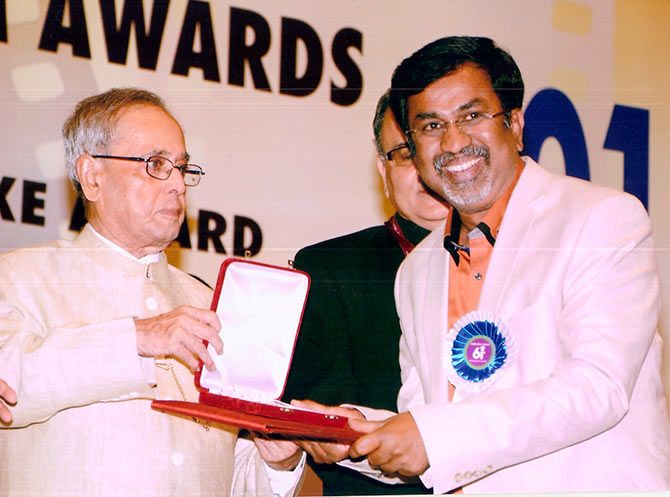
How does it help to take your film to various film festivals?
I see no assistance to movies through this participation. As a filmmaker, I only get a free air ticket and accommodation for a couple of days but my film doesn’t get anything out of it. There should be a film bazaar for the filmmaker to attract foreign buyers for his film. That should be the whole idea for any filmmaker to take his film to a festival.
What is the film December 1 all about?
After I had finished Bharat Stores, a newspaper report caught my attention about how a family, which had hosted an ex-chief minister at their home, had to leave the village because of social stigma and trauma attached to the disease of AIDS that they had contracted.
What went into the making of the film?
I had to collect details about this family from their neighbours and other villagers as I couldn’t meet the affected family.
I sourced information on the ‘village stays’ by the chief minister by personally visiting these places. The villages may have seen development because of the chief minister’s ‘village stay’ programme, but it did not improve any particular family’s socio-economic condition.
I tried to capture the inner story about the family and what they might have undergone.
It is not a political film but it is a film with a political background.
Is the film based on the newspaper report and the family that fled the village?
No. It is just a fictional and cinematic representation. I was inspired by the newspaper report. Since I couldn’t meet the affected family that fled the village, I couldn’t base the film on their lives. But, yes we have tried to show how a family’s social status in the village changes when the villagers come to know that the chief minister is visiting one of their own neighbours.
I have also tried to capture what it means for the family after the chief minister leaves the village. However, the ‘village stay’ programme was appreciated for its innovativeness and approach.
Why did you choose North Karnataka and its dialect for this film?
I wanted a proper backdrop for this story. None of my films was based in North Karnataka. The North Karnataka region has its own cultural moorings and language. I thought the story suited the setting of the region.
I shot the film in a village called Shiraguppi near Hubballi-Dharwad. I employed Chandrashekar Vastrad to write the dialogues to do justice to the dialect and the script.
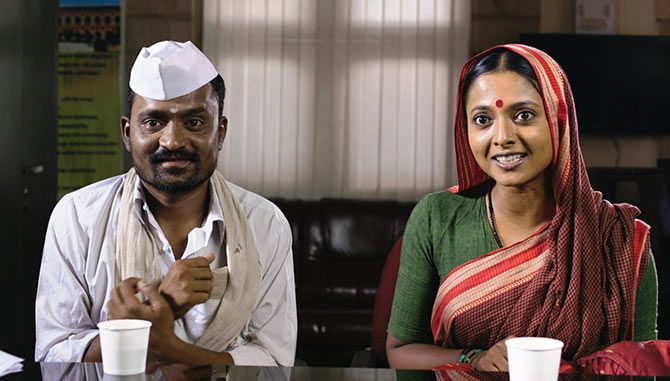
Why didn’t you cast people from the North Karnataka region to play the lead roles, like Rotti Devakka?
It was difficult for me to cast someone from Bengaluru to catch the dialect of the region. I had to go with Nivedita, a girl from Bengaluru-Mysore, to play Roti Devakka because I couldn’t find anyone suitable from there.
Devakka’s is a housewife who makes rotis and sells them to hotels in the neighbouring town. The role of the deputy commissioner was also done by a television artiste Shashikumar who is from Bengaluru.
I chose Santosh Uppina, an artiste from Vijayapura (Bijapur) to play Devakka’s husband who is now settled in Bengaluru.
The rest of them were all from the North Karnataka region. There were a lot of newcomers as my film required rawness and freshness which gave the film authenticity.
You had praised Nivedita’s performance and called her the Smita Patil of Kannada cinema. How do you justify that?
Her real name is Smitha. She has changed her name to Nivedita for personal reasons. That apart, the commitment that she showed in delivering the right expressions was awesome and astounding.
She got the body language right and she worked hard on her role. Nivedita had to walk barefoot on the dry fields of North Karnataka carrying a child in one arm and a basketful of rotis on her head. She acquitted herself well by taking up the challenge.
Just like Smita Patil was unsuitable for glamour roles, I believe Nivedita is a lot in the Smita Patil mould.
She prepared so much for the role and I see a bright future for her.
Have you perfected a formula to win national awards since all your films have won critical acclaim?
I don’t know; it may be true (laughs).
There is no formula as such. The cinematic values and social concerns should match the criteria of getting an award.
There is some amount of expectation from me although the audience that watches my films is small. I should be able to give something new every year with every new film.
Social issues have always attracted my attention. Digitisation of cinema has come as a boon to filmmakers because of the cost-effectiveness.



